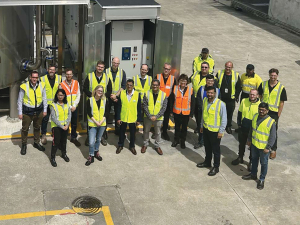Another Windfall for Fonterra Farmers, Unit Holders
Fonterra farmer shareholders and unit holders are in line for another payment in April.
 Fonterra’s Palmerston North plant has a unique combination of a commercial heat pump and solar thermal plant to help reduce gas consumption and emissions output.
Fonterra’s Palmerston North plant has a unique combination of a commercial heat pump and solar thermal plant to help reduce gas consumption and emissions output.
Fonterra has launched a unique hybrid emissions reduction solution at its Palmerston North manufacturing site.
The co-op’s first high temperature heat pump and solar thermal plant combination is up and running at Fonterra Brands manufacturing site, where much of the fresh white milk for the North Island is produced.
The heat pump converts excess heat from chillers and compressors into a heat source. This reduces the natural gas required by the site and is expected to remove 495 tonnes CO2e annually – the equivalent of taking 140 cars off the road.
This marks the fourth site within a year to upgrade energy infrastructure to help Fonterra reach its scope 1 and 2 target of 50% emissions reduction by 2030 (from a 2018 baseline).
Fonterra Palmerston North site manager Graham Thomson says the co-op is really excited about this unique combination of a commercial heat pump and solar thermal plant helping reduce gas consumption and emissions output.
The project received co-funding from the Energy Efficiency Conservation Authority’s Government Investment in Decarbonising Industry (GIDI) fund and will help inform future decarbonisation projects at Fonterra.
Fonterra is undertaking a major decarbonisation effort.
It expects to reduce emissions further through a combination of energy efficiency initiatives and switching fuels at six manufacturing sites that still use coal and ultimately stop using coal by 2037.
“We’re in the process of converting the coal boilers at the Hautapu site to wood pellets,” the co-op says.
Once complete, this year, the Hautapu site will reduce carbon emissions by a forecast 15,785 tonnes per annum – the equivalent of taking about 6500 cars off New Zealand’s roads.
The Stirling plant wood biomass boiler has been commissioned, moving the site to fully renewable thermal energy for its process heat. Changing to this boiler will reduce the annual carbon emissions by 18,500 tonnes – the equivalent of taking approximately 7700 cars off New Zealand’s roads.
The new Waitoa wood biomass boiler is now operational and will reduce the site’s annual carbon emissions by approximately 48,000 tonnes, the equivalent of taking approximately 20,000 cars off New Zealand roads.
Global trade has been thrown into another bout of uncertainty following the overnight ruling by US Supreme Court, striking down President Donald Trump's decision to impose additional tariffs on trading partners.
Controls on the movement of fruit and vegetables in the Auckland suburb of Mt Roskill have been lifted.
Fonterra farmer shareholders and unit holders are in line for another payment in April.
Farmers are being encouraged to take a closer look at the refrigerants running inside their on-farm systems, as international and domestic pressure continues to build on high global warming potential (GWP) 400-series refrigerants.
As expected, Fonterra has lifted its 2025-26 forecast farmgate milk price mid-point to $9.50/kgMS.
Bovonic says a return on investment study has found its automated mastitis detection technology, QuadSense, is delivering financial, labour, and animal-health benefits on New Zealand dairy farms worth an estimated $29,547 per season.
OPINION: Staying with politics, with less than nine months to go before the general elections, there’s confusion in the Labour…
OPINION: Winston Peters' tirade against the free trade deal stitched with India may not be all political posturing by the…